Wednesday, August 17, 2005
Title: Worldcon - Interaction 2005
Detail: 4th-8th August 2005, SECC/Moat House, Glasgow
Part:6. Saturday.
Saturday 6th August 2005.
Saturday morning, and the first event in my evolving rough itinerary is at 10am. So it’s a case of get up and get ready, grabbing recharged batteries for digital camera and mini disc recorder, and replacing the books I got signed Friday with the books I plan to get signed Saturday. And off.
Saturday 10:00 Fractured: Is British Politics too Broken to Stay Together?
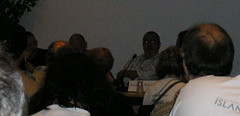
The first panel of the day wasn’t as busy as some of the ones I had been too before, but I came in sufficiently as it was starting to not be able to get a seat too close to the front. Hence the one crappy picture I got from this panel.
As with a number of panels that I ended up attending there was some overlap. So this panel to some degree fit with the Race/Migration panel from the previous day (the idea of language and religion and economic migrants) and the one that followed which was about The Future of Europe. The panel was made up of James Lovegrove, Ian R. MacLeod, Ian McDonald and Nicholas Whyte.
Both McDonald and Whyte have Irish backgrounds, so Ireland once again featured – how the split into Ireland and Northern Ireland changed things like football, and with Irish as one of the languages of Northern Ireland there was the generation of Ulster Scots for the other side.
That follows into religion, with some discussion of how an event like Guy Fawkes day is about the religious divide, and how comments are made on both sides about the conflict between Catholic and Protestants stemming from hundreds of years ago.
By contrast to the previous panel, the migrants being talked about this time were moving into mainland Europe, instead of those from mainland Europe coming into Britain. The contrast of how the poor come here for jobs and to fill skills shortages versus the better off Brits who by houses in Spain or France for the better weather. One of the conclusions regarding this idea was that it was a good thing, opening up Britain and allowing a wider viewpoint of the world and of Europe on the doorstep.
Regards government, there was some discussion about Scotland and Wales gaining more devolved power. How parties like the Conservatives are really a South of England party with very little real representation in the rest of the United Kingdom. Which brought discussion briefly back to Northern Ireland, and how the mainland UK parties had made no impact on Irish politics. In turn it was suggested the reason why regional assemblies in England have been turned down is because people prefer the idea of a remote government, one that can’t meddle in their affairs.
Saturday 11:00 Byzantium at our Borders in the 21st Century: the Future of Europe.
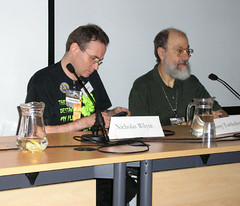
Nicholas Whyte chaired this panel, which was nominally about alternate histories and alternate futures. Though more specifically it was about Europe, the key events that have and will shape Europe, and how those could have been different. Harry Turtledove was present as a writer of alternate histories and as someone who comes from family driven out of Europe. Jon Courtenay Grimwood has also written alternate futures, and travelled round the world extensively. Keith Brooke seemed to have been given the role of insular Brit, he is a SF writer, though also the man behind the Infinity Plus website. Which leaves Patrick J. Gyger from the Swiss science fiction museum.
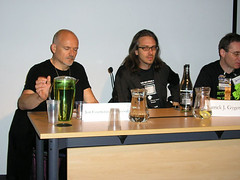
To some extent the discussion started with how European people felt. Despite being part of the European landmass Gyger insisted that Switzerland wasn’t part of Europe, with several audience members saying the same about their home of Norway. This led to discussion about borders and the development of Europe, and how these things are defined. Whyte works in the European parliament, and as well as having grown up in Ireland has also been involved with Yugoslavia and the resulting splinters that came from there – so he shared some of his insights into conflict and progress.
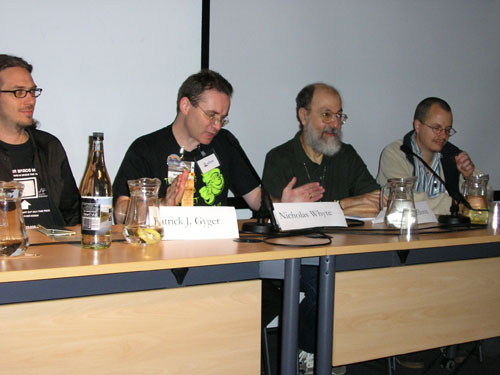
Developing the discussion in the direction of the alternate history base line, each member of the panel talked about what they considered to be key moments in European/World history and how those could have gone differently and what the effect might have been. If the UUSR had won the cold war. If the US and USSR had actually had a nuclear war. If World War II had started a little earlier. If World War I had been won by Germany, then we might have just finished the German century rather than the American.
One of the overall ideas was how little things have changed really. With the suggestion that the same powers that shaped the world 100 years ago are the same powers shaping it now; with the Austro-Hungarian Empire having been replaced by America in the scheme of things. From there, one of the biggest things affecting world borders today is the 3rd world versus 1st. Part of the conversation covering the debate over Turkey and whether it should join the European community, with Turtledove making the comparison between Turkey and Europe and Mexico and America.
Saturday 12:00 How do We Reinvent Time Travel?
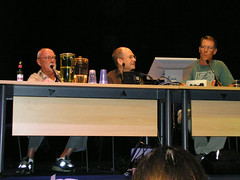
When discussing his part in the programme, Kim Stanley Robinson expressed an interest in time in the novel. Which is how he came to be moderating a panel on time travel. Though that wasn’t entirely what he had in mind.
The panel was made up of Stephen Baxter and Harry Harrison. Connie Willis failed to arrive, though Kim Stanley Robinson made a joke of it, holding imaginary conversations with her to talk about her work and the topic as a whole.
To a degree this panel overlaps with the concept of Sunday’s “Genre Killing Ideas” panel – starting from the idea of is time travel dead as an idea or not? In turn time travel overlaps with the previous panel, with the way that time travel and alternate history run as parallel concepts.
Discussion progressed to how methods of time travel. From the time machine as a literary device rather than coming from a scientific basis. To experiments with wormholes and the like, and how the latest science fad can be turned to provide some kind of scientific potential for time travel. From there came some discussion on paradox and on what periods people visit in fiction.
The panel talked about time travel novels, from their own experiments in the genre through to memorable contributions by other authors. Of course HG Wells’s Time Machine was mentioned, as was Stephen Baxter’s sequel to the Time Machine. Silverberg’s Up The Line was offered as an example, a was Philip K. Dick’s The Zap Gun and Connie Willis’s Speak To The Dog – each covering a different aspect of the conversation.
From the specifics of time travel, the panel evolved more in the direction of what Kim Stanley Robinson was really wanting to talk about – part of the gradual progression of his paneljack. His interest was in the passage of time in the novel – how in one novel five pages can cover 5 seconds of time or 5 millennia. One example of this Robinson suggested was Baxter’s Exultant, though Baxter in turn suggested that Robinson’s own Years Of Rice And Salt came into the same category. With this comes characters with extended life versus following a family over several generations and the strengths or weaknesses of each.
Which brought us round to Robinson’s real impetus and his achievement of paneljacking. With an explanation of how Olaf Stapledon had influenced the work of Virginia Wolfe. Stapledom as a fan of Wolfe had sent her a copy of one of his novels. The results of which could be seen, while Wolfe had started unconsciously to experiment with time in the novel, it wasn’t until after reading Stapledon that her work was transformed.
Saturday 13:00 Autographing
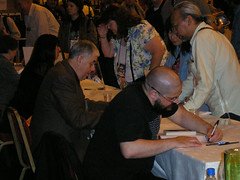
Charles Stross, James P Hogan, Liz Williams, Justina Robson signing 1pm
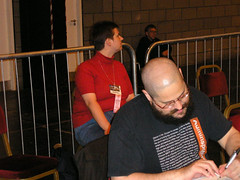
Charles Stross signing 1pm; having been reading an electronic copy of Stross's Accelerando, a series of short stories brought together as a novel, and thoroughly enjoying it, i decided to fork out the cash for a hardback copy of the book to get it signed by Charlie.
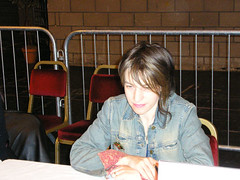
Justina Robson signing 1pm; I brought along a copy of Robson's novel Unnatural History to get signed.
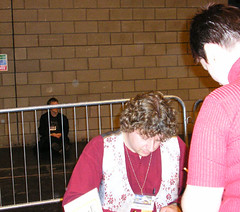
Peter Hamilton signing 1pm; having not actually read the last couple of novels by Hamilton I decided rather than bring along one of the novels i already have (especially since most of them are slabs), I would buy one of the couple I hadn't read and get that signed. Of course as tended to be the case, material by particular authors became scarce at the time they were signing. So i was left with the choice of a copy of Pandora's Star in poor condition or Misspent Youth, I opted for Misspent Youth - which Hamilton points out leads to Pandora's Star anyway.
Saturday 14:00 Autographing
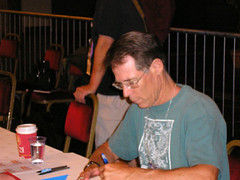
Kim Stanley Robinson signing 2pm; what to take to get Robinson to sign? A few folk had all three volumes in his Mars trilogy, some pretty impressive editions from the look of it. I decided to just take Red Mars, and the copy of his short story collection Planet On The Table, which i came across recently and had just finished reading.
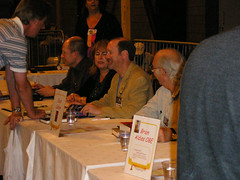
Stephen Baxter, Kevin J Anderson, Jack Cohen, with Brian Aldiss having been delayed - signing 2pm; I had meant to grab my copy of Baxter's short story collection that I have, but had managed to forget. Ho hum.
15:30 Autographing
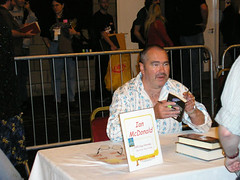
Ian McDonald signing 3.30pm; had managed to get a copy of River Of Gods signed while at the Kaffeeklatsch the previous day, but with the normal sized paperback just having been published I decided to pick up a copy of that and get it signed as a gift.
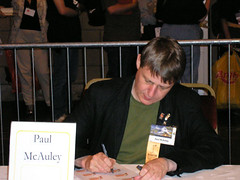
Paul McAuley signing 3.30pm; had brought a copy of White Devils with me to get signed, but decided after the previous days reading that I would pick up a hardback copy of Mind's Eye and get that signed as well.
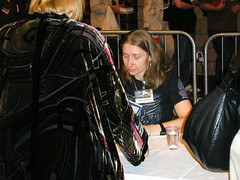
Steph Swainston signing 3.30pm
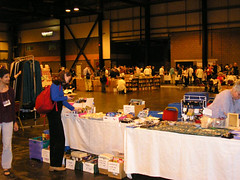
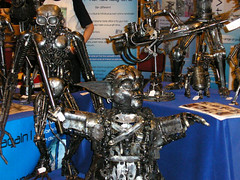
Signings dominated a good chunk of the afternoon, and since they are different from panels, in that you stand in line get your stuff signed and then move on, there was more time to kill. So I spent time between signings wandering about, and taking advantage of this really being my first full day in the dealers hall.
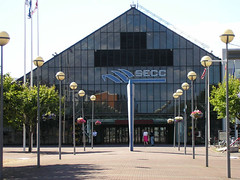
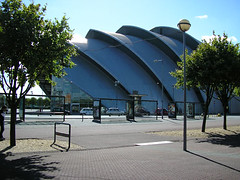
Having been to the days signings and bought what i was planning to buy for the day, I headed back out to the car park to drop off books instead of lugging them about!
Which is when I took these pictures of the convention venue - the SECC, Glasgow's busy spaceport, and the WSFS Armadillo who would launch on her maiden voyage at the end of the weekend, playing host to the Hugo awards on the Sunday night.
16:30 Reading Ian R. Macleod
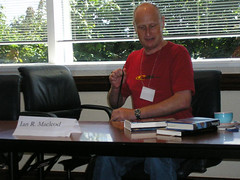
Ian R. MacLeod read in the boardroom, the bigger of the two reading rooms I was in over the weekend. He introduced himself by checking to make sure that he in the right room, apparently something he often has problems with as a lecturer in a college near Birmingham. He read two pieces, rambling on just like a lecturer in introduction of each piece. The first thing he read was an extract from a short story about the composer Elgar, which is in his Breathmoss collection of short stories. The second piece that followed was a section from his new novel House Of Storms, which is a sequel to one of his previous novels. I had been curious about MacLeod, having read several short stories in the annual Best New SF collections, like Breathmoss, and enjoyed them. Strangely, however, MacLeod was perhaps the only reading I was at over the course of the weekend where I was put off reading more of his work. Neither of the extracts struck me as being particularly my taste, which isn't to say I won't end up reading one of his books at some point anyway, but not for now.
Saturday 17:30 Reading Ian McDonald
After a short interval of half an hour, I was back to the boardroom again, this time for a reading by Ian McDonald. Similarly McDonald read two extracts, both related pieces. The first thing he read was a section from the story Little Goddess, which appeared in the June issue of Assimov, about a little girl raised to be a goddess. Which he followed by reading from the start of the first chapter of River Of Gods, which introduces McDonald's future India with a street gangster, painting a vivid picture of his novel.
After McDonald's reading and a last wander about I decided to head home rather than going straight to the room parties at the Hilton, like I had done the previous night. Thinking it would be a better idea to go home, get fed, washed, changed, perhaps have a nap, then head back out. But by the time I should have left to head back into Glasgow, I really was too tired and had been underwhelmed by the previous night anyway. So pretty much I was just ready to just sleep, so I did, allowing myself a better rest for another early start the next morning.
Comments:
Post a Comment
 this is the voice of re:mote induction.
this is the voice of re:mote induction.